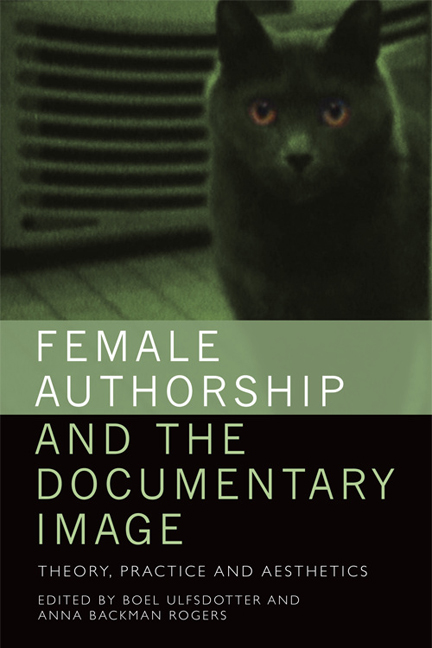Book contents
- Frontmatter
- Contents
- List of Illustrations
- Notes on the Contributors
- Foreword
- Introduction
- PART ONE DOCUMENTARY PRACTICES
- PART TWO DOCUMENTARY THEORIES
- PART THREE FEMALE AUTHORSHIP AND GLOBAL IDENTITIES
- ‘Being a Woman Documentary Maker in Taiwan’ – An interview with Singing Chen and Wuna Wu
- Select Bibliography
- Index
Introduction
Published online by Cambridge University Press: 05 May 2021
- Frontmatter
- Contents
- List of Illustrations
- Notes on the Contributors
- Foreword
- Introduction
- PART ONE DOCUMENTARY PRACTICES
- PART TWO DOCUMENTARY THEORIES
- PART THREE FEMALE AUTHORSHIP AND GLOBAL IDENTITIES
- ‘Being a Woman Documentary Maker in Taiwan’ – An interview with Singing Chen and Wuna Wu
- Select Bibliography
- Index
Summary
The topic of this book, as well as its companion volume, Female Agency and Documentary Strategies: Subjectivities, Identity and Activism, is an internationally focused study of female authorship in relation to the documentary image. Addressed by a group of scholars and practitioners at the forefront of contemporary views on this issue, these two volumes are defined by a collaborative effort to map and report on authorship from a global perspective. Given the widespread interest, and indeed nearly obsessional need, to document ourselves and the world around us in the contemporary moment, this two-volume monograph addresses issues as varied as: How do theory and praxis coalesce (if at all) for female practitioners within documentary image making practices? How do technology and contemporary media shape the strategies that inform female authorship and subjectivity? Has the digital turn brought about any major shifts in terms of female subject formation and activism? Which is the central mode of address currently in the field? Which are the key issues being dealt with? How is female authorship made manifest within a global context? Why is the notion of authorship of sustained relevance and importance to female documentary practitioners? Is female authorship always implicitly or explicitly imbricate with feminist theory?
It is commonly agreed that women's increasing claims to equal societal rights and vocalisation on a global scale have had a decisive impact on female agency in relation to the documentation of contemporary issues. Of course, this is not a new phenomenon per se; in terms of culture and scholarship, women have been seeking to establish myriad voices and perspectives on issues of gender, politics, history and selfhood throughout the various waves of social emancipation and emerging feminist agendas. Female documentary filmmakers have taken a particularly progressive stance in this practice since the arrival of lightweight equipment in the late 1950s. The 1960s women's movement further encouraged the documentation of women's lives and female agency in particular. The current impetus of an increasing globalisation, consciously reframed socio-political discourses, new technologies, not to mention developing education and job opportunities in countries outside of Western Europe and the USA, have, however, once again had a decisive impact on the way women experience and document their own lives.
- Type
- Chapter
- Information
- Female Authorship and the Documentary ImageTheory, Practice and Aesthetics, pp. 1 - 6Publisher: Edinburgh University PressPrint publication year: 2018

